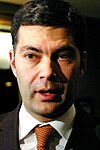39th Quebec general election
|
|
|||||||||||||||||||||||||||||||||||||||||||||||||||||||||||||||||||||||
|---|---|---|---|---|---|---|---|---|---|---|---|---|---|---|---|---|---|---|---|---|---|---|---|---|---|---|---|---|---|---|---|---|---|---|---|---|---|---|---|---|---|---|---|---|---|---|---|---|---|---|---|---|---|---|---|---|---|---|---|---|---|---|---|---|---|---|---|---|---|---|---|
|
|||||||||||||||||||||||||||||||||||||||||||||||||||||||||||||||||||||||
|
|
|||||||||||||||||||||||||||||||||||||||||||||||||||||||||||||||||||||||
|
in the National Assembly of Quebec 63 seats were needed for a majority |
|||||||||||||||||||||||||||||||||||||||||||||||||||||||||||||||||||||||
| Turnout | 57.43% | ||||||||||||||||||||||||||||||||||||||||||||||||||||||||||||||||||||||
|
|||||||||||||||||||||||||||||||||||||||||||||||||||||||||||||||||||||||

Popular vote by riding. As this is an FPTP election, seat totals are not determined by popular vote, but instead via results by each riding. Click the map for more details.
|
|||||||||||||||||||||||||||||||||||||||||||||||||||||||||||||||||||||||
|
|||||||||||||||||||||||||||||||||||||||||||||||||||||||||||||||||||||||
Jean Charest
Quebec Liberal Party
Jean Charest
Quebec Liberal Party
The Quebec general election of 2008 was held in the Canadian province of Quebec on December 8, 2008. Premier Jean Charest and the Liberal party was elected for their third mandate and formed a majority government. This was the first time since the 1950s (when the Union Nationale of Maurice Duplessis won four consecutive elections) that a party or leader was elected to a third consecutive mandate, and the first time for the Liberals since the 1930s, when Louis-Alexandre Taschereau was premier.
The 2008 election also marked the first time that Québec solidaire won a seat.
Charest called the election on November 5, saying he needed a "clear mandate" and a majority to handle the economic storm. He was criticized, however, by the Parti Québécois and the Action démocratique du Québec for calling a snap election to get a majority when they were willing to work with him to fix the economy.
Most notably, the election was marked by a significant collapse in support for the ADQ. Formerly a relatively minor party, the ADQ had attracted significant protest support in the 2007 election, beating the Parti Québécois to Official Opposition status. In 2008, however, the party's support dropped back to approximately 15 per cent of the popular vote, roughly the same range of support the party attracted before 2007. As a result of this loss of support, Mario Dumont announced in his concession speech that he would step down as party leader.
In the final days of the election campaign, the concurrent parliamentary confidence dispute became an issue, with Prime Minister Stephen Harper attacking the credibility of a potential Liberal-New Democratic Party coalition government because the Bloc Québécois had pledged to support the coalition on motions of confidence. Both Marois and Dumont called upon Charest, a former leader of the federal Progressive Conservatives, to clarify where he stood on the coalition and on Harper's use of anti-sovereigntist rhetoric in the dispute. Charest emphasized that the Bloc MPs had been legitimately elected by Quebecers, and stated that "I live in a society in which people can be sovereigntists or federalists, but they respect each other. The same thing should prevail in the federal parliament."
...
Wikipedia




